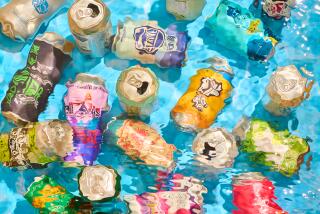Why we like pricey wines
When it comes to wine tasting, pleasure is in the price.
Using brain scanners to monitor the minds of wine drinkers, scientists found that people given two identical red wines got more pleasure from tasting the one they were told cost more.
The study, reported Monday in Proceedings of the National Academy of Sciences, demonstrated for the first time how marketing tactics -- such as raising the price of a product -- can cause the brain to play tricks on itself.
Researchers led by Antonio Rangel, associate professor of economics at Caltech, asked 20 volunteers to rank their enjoyment of small sips of five differently priced Cabernet Sauvignon wines while a functional MRI machine monitored the brain response. Volunteers also were asked to rate the flavor intensity of the wines.
Unbeknown to volunteers, two sets of wine samples were identical: the $5 and $45 wines ($5 actual price) and the $10 and $90 wines ($90 actual price). The fifth wine was identified by its actual $35 price.
Volunteers were asked to rank the pleasantness of the wines. They liked the $90 wine best and the $5 wine least.
Brain scans showed that activity in the part of the brain that detects pleasure also moved in lock step with price. The medial orbital prefrontal cortex, which is located behind the eyes, showed the greatest activity when volunteers drank the wine marked $90 and the least activity when they sipped the wine priced at $5.
Prices had no effect on flavor intensity ratings. Volunteers said the $5 and $45 wines and the $10 and $90 wines were identically sweet.
Rangel said the findings showed that pleasantness of consuming a product relied not only on the product’s intrinsic properties, such as flavor in the case of wine, but also on certain beliefs, such as the notion that expensive wines will probably taste better, he said. By manipulating prices “we can change how wine tastes without changing the wine,” Rangel said. “It’s mind-blowing.”
Two weeks after the experiment, volunteers were asked to rate the wines in the absence of price data. They liked the wines originally marked $5 and $45 best and the samples labeled $10 and $90 second best.
George Loewenstein, professor of economics and psychology at Carnegie Mellon University in Pittsburgh, who was not involved in the study, said the findings supported research on consumer behavior.
“People pay high prices for water from Italy, and we know that water tastes about the same wherever it comes from,” he said. “Price is one of the many attributes that people pay attention to, and it affects how we perceive things as a consumer.”
--
More to Read
Eat your way across L.A.
Get our weekly Tasting Notes newsletter for reviews, news and more.
You may occasionally receive promotional content from the Los Angeles Times.






